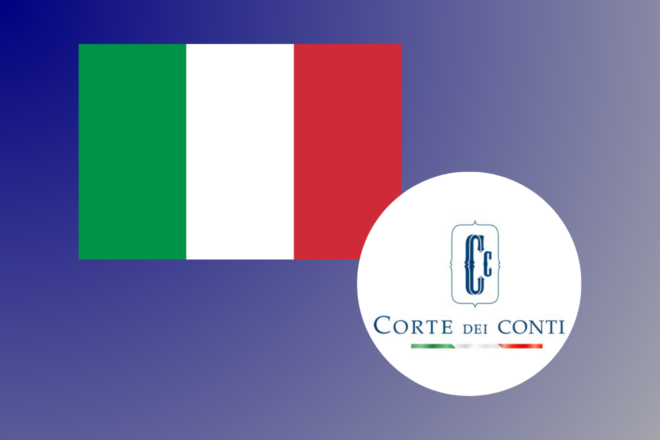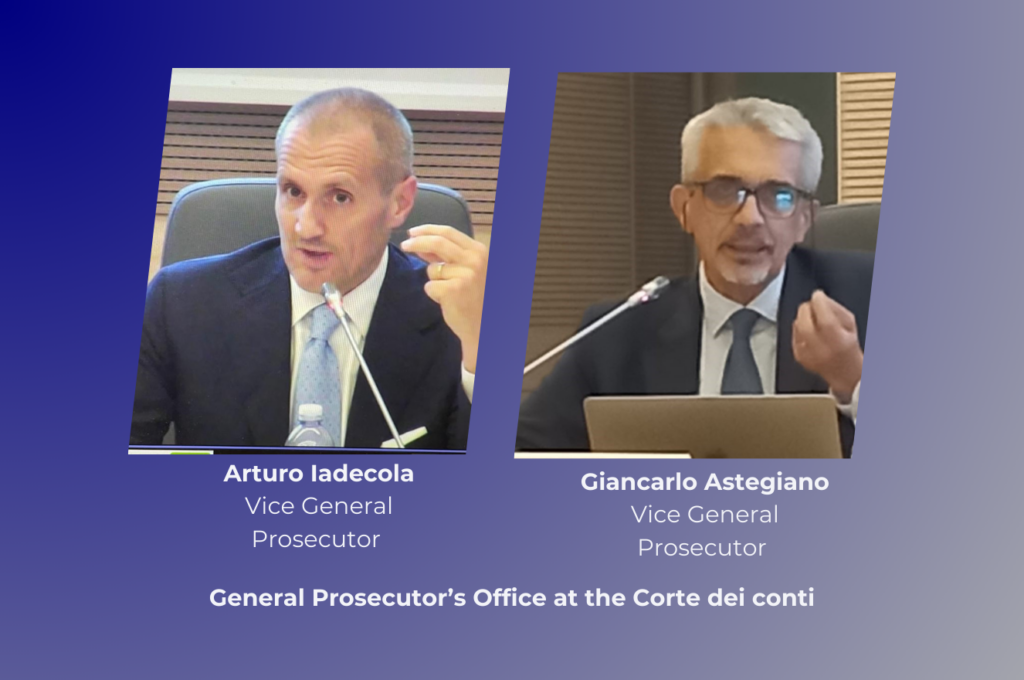The Corte dei conti fights against fraud in European Union funds and the National Recovery and Resilience Plan through jurisdictional activities

Authors: Vice General Prosecutor Giancarlo Astegiano; Vice General Prosecutor Arturo Iadecola; General Prosecutor’s Office at the Corte dei conti
The European Union needs a strong protection of its funds in order to ensure its administration, and to allocate resources to the Member States or other beneficiaries, for the implementation of its own policies. Both tax evasion and illicit conduct resulting in the receipt of undue funding or the diversion of such funds from their intended purposes cause damage to the European Union (EU)’s treasury.
The jurisprudence of the Court of Cassation – which in Italy adjudicates on the distribution of jurisdiction among the various judicial bodies – has long been oriented towards recognizing the jurisdiction of the Corte dei conti over private entities that have unlawfully obtained, or diverted from the established purpose, public contributions. The argument is that “where a private entity, to which public funds are disbursed, negatively affects the manner in which the program imposed by the public administration is implemented, to which it is called to participate with the grant of the contribution, and the impact is such as to lead to a deviation from the pursued purposes, it causes damage to the public entity – even from the mere perspective of depriving other companies of the funding that could have led to the implementation of the plan as formulated and approved by the public entity with the cooperation of the same entrepreneur – for which it must be held accountable before the auditing judge” (Cass., Sez. un., ord. n. 4511/2006).

It is worth noting that the jurisdiction of the Corte dei conti also extends to actions for the refund to the European Commission of directly disbursed contributions. According to the rules in force, “there is no discriminatory application based on the supranational nature of the protected administration or the nature of the disbursed contribution. Instead, in accordance with the principle of assimilation, under which European financial interests are assimilated to national ones, the same measures provided by domestic law must be ensured for their protection” (Cass., Sez. un., ord. n. 20701/2013).
Illicit behaviors aimed at misappropriating or diverting EU resources often cause damage both to the European Union’s treasury and to the national treasury. In any case, jurisdiction over actions for damages against the perpetrators of such offenses lies with the Corte dei conti, pursuant to the principle of assimilation under Article 325 of the Treaty on the Functioning of the European Union, as it is the judge responsible for determining damage to the State treasury in accordance with domestic law.
The actions of the regional Prosecutor’s Offices to protect EU resources mainly involve filing lawsuits – indictments – for damages against recipients of disbursed contributions, in whole or in part, from said funds. When it comes to collective organizations (companies, associations), action can be taken not only against these entities, but also against those who, as their legal representatives or de facto controllers, have contributed to the offense by diverting public resources obtained for their own benefit.
In 2023, the Regional Jurisdictional Chambers of the Corte dei conti issued convictions for the reimbursement of treasury damages in the EU funds sector, amounting to approximately 20 million euros. The mainly affected funds include:
- The European agricultural guarantee fund (EAGF),
- The European agricultural fund for rural development (EAFRD),
- The European Maritime and Fisheries Fund (EMFF),
- The European Structural and Investment Funds (ESI),
- The European Regional Development Fund (ERDF), and
- The European Social Fund (ESF).
The Regional Prosecutors issued over 100 indictments, amounting to over 20 million euros.
At the same time, the investigative and pre-trial activities of the Prosecution Offices confirmed the importance of collaboration with other national and international organizations involved in combating the misuse of public funds, as well as the use of asset protection measures.
The offenses also concern the National Recovery and Resilience Plan (NRRP), launched between September 2020 and April 2021, in compliance with the provisions of EU Regulation No. 241 of February 12, 2021, which established the Recovery and Resilience Facility within the framework of the Next Generation EU program.
Some of the illicit acts, concerning the improper or non-utilization of EU resources, can evidently also occur in relation to the implementation of the National Recovery and Resilience Plan and, therefore, can constitute a useful and valid reference in the verification and control proceedings of the actual use of public funds from the Plan.
In particular, illicit conduct in this sector may consist of the improper receipt of resources by implementing entities, the failure to comply with schedules for the implementation of projects under the missions provided for in the PNRR, the non-use or diversion of resources allocated for PNRR projects, and the construction of works not conforming to the projects with the diversion or waste of allocated resources.
Finally, the General Prosecutor’s Office, as the supervisory office, coordinates with supranational bodies and institutions of other Countries through the International Affairs and Interinstitutional Relations Service for combating corruption and the illicit use of European funds.

Collaboration is underway with the European Public Prosecutor’s Office (EPPO), based on the Working Agreement signed by the European Public Prosecutor and the General Prosecutor at the Corte dei conti on September 13, 2021.
According to this agreement, which aims to provide a structured framework for cooperation, the preferred channel of collaboration between Criminal Prosecution Offices and Regional Prosecutors’ Offices at the Corte dei conti involves the exchange of information, which extends beyond what is provided for by primary legislation. The European Prosecutor’s Offices and the Regional Prosecutors’ Offices at the Corte dei conti are also required to activate an additional level of coordination, if necessary through meetings or similar initiatives, in cases where, following the exchange of information, they have initiated investigations into related facts.
Another area of cooperation with supranational organizations is with the European Anti-Fraud Office (OLAF), under the Administrative Cooperation Agreement signed on September 25, 2013. According to Article 325 of the Treaty on the Functioning of the European Union, the Court of Auditors and OLAF share information on facts causing damage to EU financial interests, provide mutual technical and operational assistance, conduct joint strategic analyses, and implement training and personnel exchange programs.





